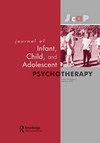Change in the Play of Children Who Experienced Early Relational Trauma: Theoretical and Clinical Reflections on Psychodynamic Intervention
Q3 Psychology
Journal of Infant, Child, and Adolescent Psychotherapy
Pub Date : 2021-07-03
DOI:10.1080/15289168.2021.1945729
引用次数: 3
Abstract
ABSTRACT Children who experienced early relational trauma resulting from chronic exposure to maltreatment and neglect within the parent-child relationship in the early years of life are often trapped in traumatic play with no possibility of psychic elaboration or have difficulty using play in a manner that is beneficial to them in traditional play psychotherapy. The purpose of this article is twofold. Firstly, it describes how play changes in the course of psychotherapy with children who experienced early relational trauma. Secondly, it demonstrates how therapists must use different types of interventions to meet the needs of traumatized children, particularly their capacity to play to overcome the deleterious effects of trauma. A four-stage model of how play changes over the course of psychotherapy with children who suffered from early relational trauma is proposed. Finally, each stage is analyzed regarding the features expected in the play and the psychotherapeutic interventions that should be used accordingly. A clinical illustration is also discussed.经历过早期关系创伤的儿童的游戏变化:心理动力学干预的理论和临床反思
在童年早期,由于长期暴露于虐待和忽视的亲子关系中而经历了早期关系创伤的儿童,往往被困在创伤性的游戏中,无法进行精神上的阐述,或者在传统的游戏心理治疗中,难以以对他们有益的方式使用游戏。这篇文章的目的是双重的。首先,它描述了经历过早期关系创伤的儿童在心理治疗过程中的游戏变化。其次,它展示了治疗师必须如何使用不同类型的干预来满足受创伤儿童的需求,特别是他们克服创伤有害影响的能力。一个四阶段的模型,如何发挥变化的过程中,心理治疗与儿童遭受早期的关系创伤提出。最后,对每个阶段进行分析,考虑到戏剧的特征和应该使用的心理治疗干预措施。还讨论了一个临床实例。
本文章由计算机程序翻译,如有差异,请以英文原文为准。
求助全文
约1分钟内获得全文
求助全文
来源期刊

Journal of Infant, Child, and Adolescent Psychotherapy
Psychology-Clinical Psychology
CiteScore
1.70
自引率
0.00%
发文量
37
 求助内容:
求助内容: 应助结果提醒方式:
应助结果提醒方式:


